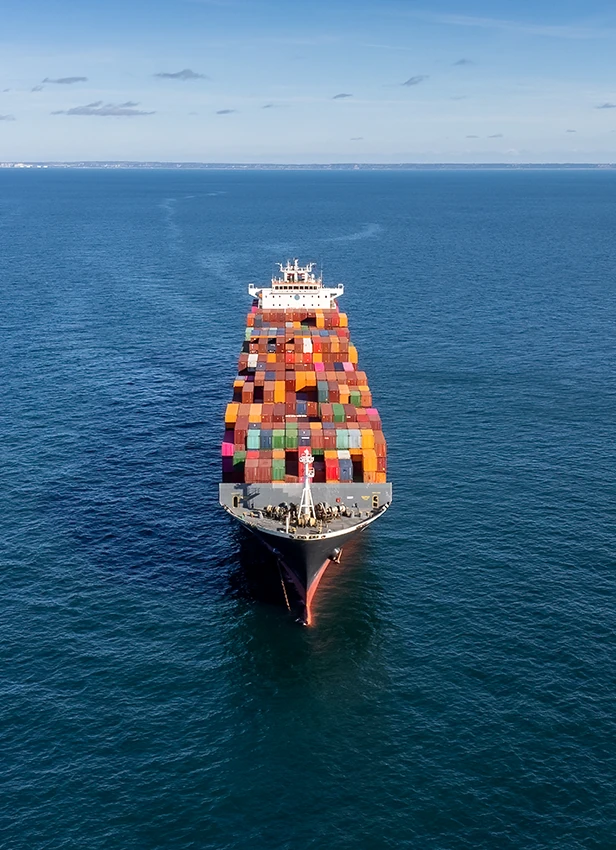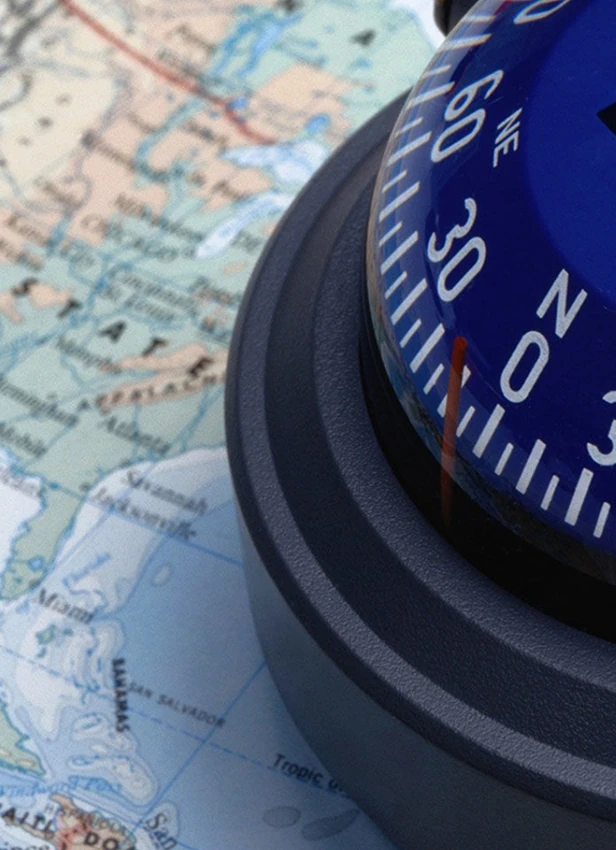Deep Sea Pilotage
Deep Sea & Coastal Pilots provide their deep sea pilotage services to a wide variety of vessels including Liner, Car Carriers, VLCC’s, Product tankers, Bulkers, Gas Carriers and many more.
Our operations team is available 24/7
Delivering safe navigation through Europe’s busiest waters
At Deep Sea & Coastal Pilots, we deliver specialised Deep Sea Pilotage services for vessels transiting the English Channel, Dover Strait and the North Sea, some of the most congested and complex maritime routes in the world. With over 500 vessel movements daily, dense Traffic Separation Schemes (TSS), variable weather conditions, high volumes of fishing traffic, and expanding offshore infrastructure, navigating these waters demands expert knowledge and experience.
Our Trinity House-licensed deep sea pilots are all former Masters, each with a minimum of three years’ command experience before undergoing specialist training and examination. This gives them a deep, practical understanding of regional navigation, buoyage systems, regulations, and environmental risks. They integrate seamlessly with bridge teams, providing real-time navigational expertise and reducing pressure on the Master, particularly during high-risk or fatigue-prone transits.
Why Choose Deep Sea & Coastal Pilots?
Unrivalled Expertise and trusted experience
Our pilots are highly qualified former Master’s who combine real-world command experience with in-depth training in deep sea pilotage. Each pilot is licensed by Trinity House, under a scheme recognised by the International Maritime Organization (IMO) and regulated by the UK Maritime and Coastguard Agency (MCA).
Through their expertise, our pilots are uniquely positioned to:
- Enhance navigational safety through precise local knowledge
- Support safe and efficient passage planning in busy waters
- Reduce fatigue and pressure on the Master and bridge team
- Strengthen situational awareness and teamwork on the bridge
- Ensure compliance with rest-hour regulations
- Act as an impartial, experienced advisor in high-risk situations
- Facilitate knowledge transfer and training for bridge teams, supporting onboard learning and continuous improvement in safety culture


Industry Recognition & Regulatory Alignment
Our services are supported by international maritime guidance and recommended best practices, including:
- IMO Resolution A.486(XII) – Recommends the use of deep sea pilots for transits through the English Channel and North Sea
- MCA MGN 506(M) – UK Government guidance on deep sea pilotage in the North Sea, English Channel, and Skagerrak
- P&I Clubs and Classification Societies – Many insurers and class bodies advise the use of deep sea pilots as a risk reduction measure
Built for Modern Shipping. Backed by Tradition.
With a heritage rooted in UK maritime tradition and a forward-looking approach to safety and performance, Deep Sea & Coastal Pilots are a trusted partner to global operators seeking assurance, insight, and excellence during their most critical passages.
To discuss your requirements or arrange our pilotage services, please contact us directly. Our operations team is available 24/7 to assist with boarding coordination, scheduling, and rates.
Supporting a wide range of vessels
By boarding vessels prior to critical chokepoints such as the Dover Strait, our pilots help optimise passage planning, ensure compliance, reduce fuel consumption, and enhance crew awareness and onboard safety culture. Whether your vessel is bound for Rotterdam, Hamburg, Antwerp, or deeper into the Baltic Sea, Deep Sea & Coastal Pilots ensures safe and efficient passage through Europe’s most strategic yet hazardous waters.
We routinely support a wide range of vessel types, including:

VLCCs and ULCCs

LNG, LPG and Chemical Carriers

Liner and Car Carriers

VLCCs Product and Crude Oil Tankers

Bulk Carriers

Naval and Government Vessels

Specialist and High-Value Tonnage

Cruise Ships
Pilot Boarding Locations & Flexibility
We offer flexible boarding via launch at key locations along the approaches to the English Channel and North Sea:
- Brixham, UK (for vessels <18m draft)
50º 25.00'N - 3º 25.70'W - Brixham, UK (for vessels >18m draft)
50º 23.87'N - 3º 22.68'W - Cherbourg, France (3NM)
49º 43.5'N - 1º 42.0'W - Cherbourg, France (7NM)
49º 47.5'N - 1º 39.0'W - Skagen (Skaw), Denmark
57º 46.5'N - 10º 46.0'E
We can also arrange for pilots to board vessels alongside at ports throughout Northwest Europe, offering full flexibility to align with your vessel's schedule.
Key Benefits of Deep Sea Pilotage
Safety, Efficiency, Compliance, and Crew Development
When transiting the English Channel, Dover Strait, or North Sea, your vessel faces a unique mix of navigational hazards: high vessel density, narrow Traffic Separation Schemes (TSS), unpredictable weather, offshore wind farms, oil and gas platforms, and concentrated fishing activity. Our Trinity House-licensed Deep Sea Pilots provide tangible, measurable advantages for shipowners, operators, and Masters.
1. Increased Navigational Safety
- Real-Time Local Intelligence – Immediate awareness of buoyage changes, TSS adjustments, and region-specific hazards.
- Collision Risk Reduction – Expert manoeuvring advice in some of the world’s busiest shipping lanes.
- High-Risk Area Management – Guidance in choke points like the Dover Strait, where margins for error are minimal.
- Close-Quarters Navigation Expertise – Reduces the likelihood of incidents, near-misses, or costly delays.
Example: In 2024, a tanker transiting the Dover Strait under the guidance of a Deep Sea Pilot avoided a potential close-quarters situation with two crossing bulk carriers — identified early and resolved through adjusted speed and routing.
2. Enhanced Passage Planning & Fuel Efficiency
- Optimised Routing – Identifying the safest, shortest, and most efficient track for your vessel.
- Fuel & Emissions Savings – Lower bunker consumption through optimised speed and tidal planning.
- Reduced Port Costs – Use of safe drift and anchorage zones outside port limits to avoid unnecessary charges.
- Seamless Integration – Liaison with VTS, Ship Reporting Systems (SRS), and Channel Navigation Information Services for smoother compliance.
Example: By applying tidal-stream optimisation during a Rotterdam-to-Hamburg passage, our pilot reduced voyage time by 4 hours, saving 12MT of fuel and 38 tonnes of CO₂ emissions.
3. Fatigue Management & Compliance
- Master Relief During Critical Phases – Allowing the Master to focus on strategic decision-making and operational oversight.
- Hours of Rest Compliance – Support in meeting STCW work/rest hour requirements.
- Reduced Pressure on Small Crews – Particularly vital for vessels with minimal manning levels.
- Operational Readiness on Arrival – Crew are rested and better prepared for demanding port operations.
Example: On a container vessel bound for Antwerp, our pilot provided continuous navigation support overnight, allowing the OOW rotation to remain within rest-hour limits — preventing both regulatory breach and crew fatigue.
4. Operational & Cost Advantages
- Reduced Insurance Exposure – Lower risk profile recognised by P&I Clubs and Classification Societies.
- Avoidance of Incidents & Delays – Preventing costly diversions, repairs, or reputational damage.
- Charter Party Compliance – Meeting or exceeding voyage performance terms.
- Improved Commercial Reputation – Demonstrating proactive safety measures to charterers and stakeholders.
5. Environmental Responsibility
- Lower Carbon Footprint – Efficient routing and optimised speed profiles reduce emissions.
- Pollution Prevention – Minimising risk of groundings, collisions, or anchor damage to subsea assets.
- Compliance with ESG Policies – Supporting owner and charterer environmental commitments.
- Protection of Sensitive Areas – Avoiding marine protected zones and environmentally vulnerable regions.
6. Knowledge Transfer & Crew Development
- On-the-Job Training – Pilots actively mentor junior officers and newly appointed Masters during live navigation.
- Bridge Resource Management (BRM) – Improved coordination and communication between bridge team members.
- Long-Term Safety Culture – Lessons learned during pilotage remain embedded in bridge team practice.
- Confidence Building – Officers gain experience in complex, high-traffic navigation under expert guidance.
Example: A first-trip Chief Officer on an LNG carrier gained critical familiarity with North Sea offshore wind farm layouts under a pilot’s guidance — later applying this knowledge to independent passages without incident.
Order a Pilot Today
To discuss your requirements or arrange our pilotage services, please contact us directly. Our operations team is available 24/7 to assist with boarding coordination, scheduling, and rates.
